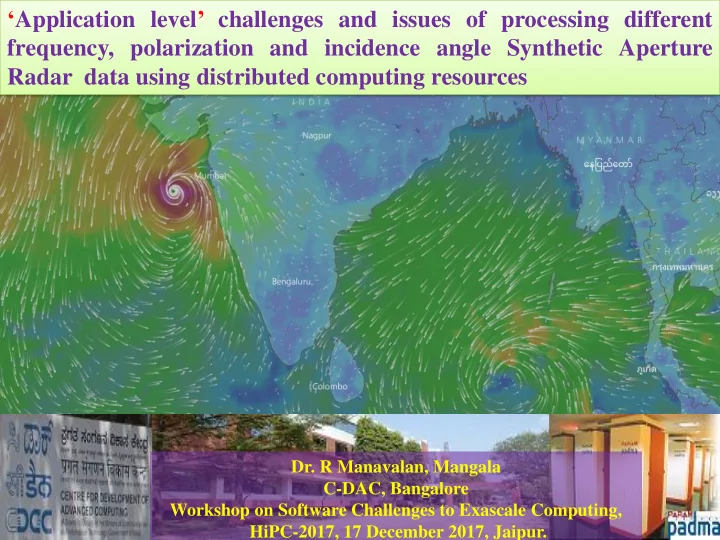

sairam ‘ Application level ’ challenges and issues of processing different frequency, polarization and incidence angle Synthetic Aperture Radar data using distributed computing resources Dr. R Manavalan, Mangala C-DAC, Bangalore Workshop on Software Challenges to Exascale Computing, HiPC-2017, 17 December 2017, Jaipur.
sairam ‘ Application level ’ challenges and issues of processing different frequency, polarization and incidence angle Synthetic Aperture Radar data using distributed computing resources Are we having ‘ real time/day wise ’ information’ about Cyclone movement, rainfall estimation, forecasting regions which are inundated due to (Ockhi) cyclone … ? Dr. R Manavalan, Mangala C-DAC, Bangalore Workshop on Software Challenges to Exascale Computing, HiPC-2017, 17 December 2017, Jaipur.
About SAR Technology, Role of SAR in regional scale disaster monitoring, Data volume/dimension of SAR based application models Dec. 8 2007 - Jan. 22 2008
RADAR data Processing - How complex the technology and issues at data capturing level S, C, L, P… * *
SAR Data Processing (L 0 Level): Issues at computational level Data dimension: Increase and Decrease M-1 Synchronization Check Auxiliary data extraction BAQ encoding Range Compression M-2 Motion sensing M-3 IQ bias removal STC correction M-4 Clutter lock M-5 FDC Estimation PRF slaving M-6 FDC Estimation & FFT Block Processing Phase Compensation RCM Azimuth Compression & FFT M-7 Mosaicking & North Orientation
Issues at computational level: Doppler Centroid Estimation Issues at computational level: Browse Processing -1 to 0.1 to +1 -1 +1 (Clutter Lock)
Issues at computational level: Simultaneous extraction different Polarization channels
Issues at computational level: ‘ Simultaneous ’ extraction different Polarization channels HH, VH, VV Polarization data of same region affected by flood (~ 3064 Sq.km; 12GB -> 450 MB at 4m, Time taken 6-7 hours/per scene) Polarization • Co – HH/VV • Cross – HV/VH • Dual Co or Dual Cross: HH+VV, HH+HV or VV+VH • Quad-polarization imagery (HH, HV, VH &VV) • Circular (Right or Left) • Compact
Swath coverage Selectable within 107 – 659 km off-nadir distance on either side Incidence angle 12º – 55º coverage Operating mode Polarization mode Single Pol Dual Pol Circular (Hybrid) Quad Pol HH/HV/VV/VH HH+HV/VV+VH Polarimetry HH+HV+VV+VH TX: CP Rx: V and H (Experimental) HRS 1 m(Azimuth) x 0.67 m (Range) resolution, 10 km x 10 km (10 x 100 km Experimental) Spot Min σ 0 = -16 dB FRS-1 3 m(Azimuth) x 2 m (Range) resolution, 25 km swath Min σ 0 = -17 dB FRS-2 3 m(Azimuth) x 4 9 m(Azimuth) x 4 m (Range) m (Range) resolution, 25 km resolution, 25 km swath swath Min σ 0 = -20 dB σ 0 = -19dB MRS 21-23 m (Azimuth) x 8 m (Range) resolution, 115 km swath Min σ 0 = -17 dB CRS 41-55 m (Azimuth) x 8 m (Range) resolution, 223 km swath Min σ 0 = -17 dB Image credit: ISRO/SAC
Sensor Mode RISAT-1 Hybrid polarimetric image of Jaipur, India in ScanSAR mode (Image credit: ISRO/SAC)
Landsat image of Jaipur, India (Image credit: Google Earth)
Issues at Preprocessing level: Processing of different frequency data (Simultaneous) Different Frequency: C, L, P.. band SAR data Simultaneous frequency airborne data from • NASA/JPL: AIRSAR @ C, L, P Frequency • DLR : F-SAR
Data Processing at different Muti-look (Simultaneous) C-band Frequency of HH and HV Polarization L-band Frequency of HH Polarization (~ 50 x 50 Sq KM) Hours: 9 X 3@L 1 Level Hours: 2 X 3@L 1 Level
Critical information extraction Area: 75 x75 Sq km Data reduction: 9GB to 1 Mb Time taken: • 2 days • Reduced to 45 minutes
Sairam Why Exascale? - from hardware to fundamental algorithms, programming models, compilers and application codes Integrated ‘ day wise ’ RT/NRT system that support Cyclone-Rainfall Estimation -Flood area mapping at country level o Ockhi 2017 (Nov 29 to Dec 6, 2017) Data covering regional scale (country wise) cann’t be processed with 284 boats with 2641 - 462 single cluster or even with few distributed resources o Increase and decreasing nature of data dimension during the run time Simultaneous SAR data processing SW environment Different frequency data (C, L , P … ) Different polarization data (HH, VV, HV, VH … ) Different mode Simultaneous multi-look of data and simultaneous post processing SW environment at different levels Future Work : Need to work for SAR Exascale processing software mainly to meet regional scale real time disaster requirements that can make available day wise critical information
Computational Grids which supports EO simulations gpod.eo.esa.int cdac.in Information don’t have value if it has not been derived at right time by right setup Thanks Thanks
Recommend
More recommend